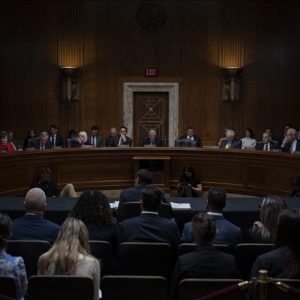Science confirms world needs to stop emissions to limit warming: UN Environment Program chief
DUBAI (AA) – Discussions are heating up about what COP28 will be able to deliver, particularly in terms of the language related to a fossil fuel phase-out. Meanwhile, a top UN official has reiterated that the science on the matter is “irrefutable, indisputable and unassailable.”
“I think the world has spoken and, for more than 30 years, the science has been absolutely clear,” Inger Andersen, executive director of the UN Environment Program (UNEP), told the media on the sidelines of the 2023 UN Climate Change Conference in Dubai.
Andersen’s comments came in the context of the debate stirred up by Sultan Ahmed al-Jaber, head of the Abu Dhabi National Oil Company and the COP28 president, with his past remarks on the need for a transition away from fossil fuels.
A recent report by British daily The Guardian cited al-Jaber claiming in a previous discussion that there is “no science” indicating that a phase-out of fossil fuels is needed to limit global warming to 1.5 degrees.
Following global furor, al-Jaber held a press conference at COP28 to walk back the comments, saying they were misinterpreted and that “the phase-down and the phase-out of fossil fuels is inevitable, essential.”
Commenting on the controversy, Andersen asserted that the science is “irrefutable, indisputable and unassailable.”
“The Intergovernmental Panel on Climate Change (IPCC), with ever greater precision, has told us what is happening in our atmosphere and in terms of global warming,” she underlined.
“The science stands … Therefore, the phase-down or phase-out … it has to be a non-carbon, non-emissions world that we live in, where we have a balance of the emissions that we will have, whether from forest fires or whatever else that may happen, but it has to be in balance with what nature can absorb, what the oceans can absorb.”
What is happening now is that our planet cannot absorb, she added.
“Would these statements that are attributed (to al-Jaber), influence (negotiations on fossil fuels)? I do not think so. Because the world is here watching and they are here to find solutions, to make commitments,” she noted.
– ‘Failing grade’ on climate justice –
Andersen said the summit so far has surprised many with the pace at which the agenda was adopted, as well as the agreement on the Loss and Damage Fund.
She said contributions to the fund are currently at around $700 million and increasing every day, but emphasized that the amount is still “not enough.”
“We need billions and billions, but it is a beginning,” she said.
The Loss and Damage Fund agreed on the first day of COP28 aims to provide financial assistance to vulnerable nations for recovery from climate-related disasters and the impacts of climate change.
“The wealthy world, G20 (nations), are responsible for 76% of all emissions, therefore, they have the responsibility first … to phase-down and phase-out, to decarbonize their economies,” Andersen said.
On the contrary, she pointed out, there has been an increase in oil, gas and coal production.
According to UNEP data, the world emitted around 55 gigatons of emissions in 2021, but the figure increased 1.2% to 57 gigatons in 2022.
“Unacceptable, which is why we need to absolutely turn this around. To turn this around, we need to have climate justice,” Andersen said.
“We have to have solidarity in the very same breath and it is smart investment in the future to invest in poorer countries. That is where we need to go. We are not there, so we are getting a failing grade. We have to now see what the rest of the summit delivers.”










